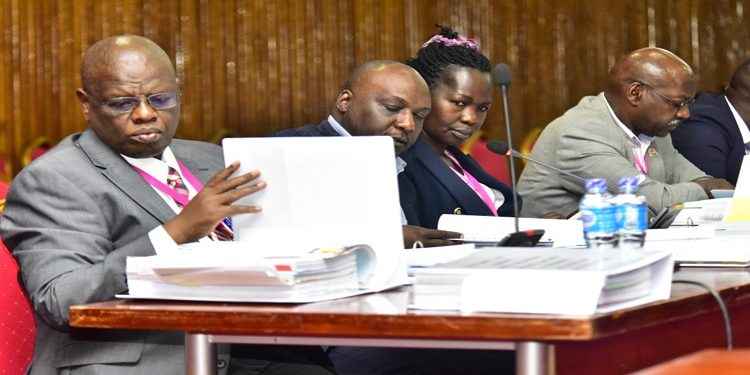The Uganda Civil Aviation Authority (UCAA) is yet to sign tenancy agreements with cargo handling companies, ENHAS and DAS as they await a decision by the Chief Government Valuer.
The authority’s Director General, Fred Bamwesigye made this revelation while meeting Members of Parliament (MPs) on the Committee of Commissions, Statutory Authorities and State Enterprises (COSASE) on Wednesday, 10 July 2024.
The committee is scrutinising the Auditor General’s report of the UCAA for the financial year 2022/2023.
In the report, the Auditor General noted that whereas the UCAA allocated space at the new cargo terminal to ENHAS and DAS, no tenancy agreements have been signed.
“Without formal tenancy agreements, this denies the authority legal grounds upon which to bill and collect revenue. I advised the accounting officer to expedite the formalisation and regularisation of the tenancy of these two companies to enable the authority enforce rents due and other attendant obligations,” read the report in part.

Sseggona (seated) with an official from UCAA during the committee meeting
UCAA’s Finance Director, Hassan Musinguzi explained that the contention is in the new rent figure of US$15 per square metre following a valuation by the Chief Government Valuer.
“When they [ENHAS and DAS] occupied in 2022, we gave draft agreements which figure they contested and at that point, we sought guidance from Chief Government Valuer who lowered the value from US$15 to US$8.
Musinguzi added that, ‘we disputed that because the previous figure was US$7. We cannot have an increment for the new facilities of US$1 only’.
He said that the two handling companies also disputed the US$15 and appealed.
“However, they have concession agreements. We billed the companies and MENZIS paid at the old rate of US$7 as we wait for further guidance from the chief government valuer,” Musinguzi said.
UCAA’s Director General Fred Bamwesigye justified the increment of rent saying that the new cargo centre eases the business of the companies.
“We asked the Chief Government Valuer to review but when he returned the figure, it was disappointing and we could not accept. We have a meeting with the Chief Government Valuer and the companies and we want the valuer to give us valuation based on how the new facilities eases their businesses,” said Bamwesigye.
This prompted Committee Chairperson, Hon. Medard Sseggona to question the parameters used by the Government Chief Valuer to reduce the rent amount.
“Can you share with us the valuation from the Chief Government Valuer and the final returns because it is really disturbing. In the meantime, on what terms are they [ENHAS and DAS] occupying? They should not have moved from the old to the new without having agreed on the amount,” said Sseggona.
He added that once the committee reviews the necessary documents, a decision will be taken, which may include interfacing with the Chief Government Valuer.
“We will decide whether the Chief Government Valuer comes here to tell us how you value because there is what we call a margin of error, but a margin of error cannot go to US$7,” Sseggona said adding that, ’the Chief Government Valuer is an internal government officer who guides you when you are negotiating; nothing stops you from charging even US$30 as long as you are not charging below what the government valuer has returned’.
Hon. Yusuf Nsibambi (FDC, Mawokoto County South) pointed out that the law does not mandate the Chief Government Valuer to fix prices for cargo handling services.
“You can do it independently with the companies or you go out to seek further guidance, which is okay. You cannot go back to the valuer to review; you cannot go back to the person who gave a lower figure,” he said.
The new Cargo terminal is a self-contained facility approximately, 6,700 square metres and has capacity of 100,000 tonnes with parking apron, landside and airside access roads and cooling facilities.
According to the allocation, EHNAS and DAS occupy 80 percent of the cargo terminal building.







Discussion about this post